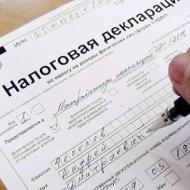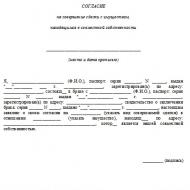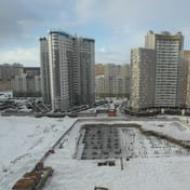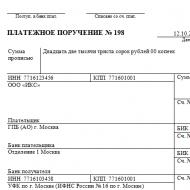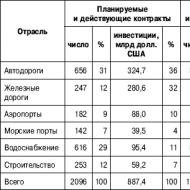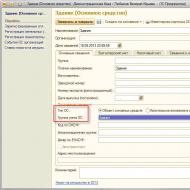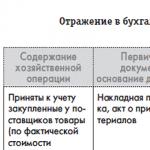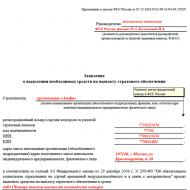
Article 103 of the Housing Code of the Russian Federation, judicial practice. Grounds for eviction of citizens from specialized residential premises. Without the provision of other premises it is impossible to discharge
The list of types of specialized housing facilities (specialized residential premises) is established in Art. 92 of the Housing Code of the Russian Federation.
Residential premises of a specialized housing stock include: service residential premises; residential premises in dormitories; residential premises of a flexible stock; residential premises in houses of the social service system; residential premises of the fund for temporary settlement of internally displaced persons; residential premises of the fund for temporary settlement of persons recognized as refugees; residential premises for social protection individual categories citizens.
This list is formulated as exhaustive.
The intended purpose of these residential premises is determined in Art. Art. 93 - 98 Housing Code of the Russian Federation. The use of specialized residential premises is carried out in accordance with rental agreements for such premises.
Termination of the tenancy agreement
specialized residential premises
The Housing Code distinguishes between termination (Article 101) and termination (Article 102) of a rental agreement for specialized residential premises. Logically, this is not entirely correct, since termination of the contract necessarily entails its termination. Therefore, it would be more correct to consider termination of a rental agreement as one of the grounds for termination of such an agreement.
The rental agreement for specialized residential premises may be terminated at any time by agreement of the parties.
Termination of a rental agreement for specialized residential premises is possible:
a) by agreement, i.e. mutual consent of the landlord and the tenant;
b) at the initiative of the employer;
c) at the initiative of the lessor.
In the latter case, termination of the contract is carried out in court (Part 3 of Article 101 of the Housing Code of the Russian Federation).
According to Part 2 of Art. 101 of the Housing Code of the Russian Federation, the tenant of a specialized residential premises may at any time terminate the lease agreement for the specified residential premises.
The fact that the tenant has the right to unilaterally terminate the rental agreement for specialized residential premises at any time implies that in order to terminate the agreement in in this case The will of only one party is sufficient. Termination of the contract on the basis of Part 2 of Art. 101 of the Housing Code is carried out out of court. It is only necessary that the tenant notify the landlord of the unilateral termination of the contract, guided by the requirements of the rental contract concluded with him and the corresponding standard contract for the rental of specialized residential premises (Part 8 of Article 100 of the Housing Code of the Russian Federation).
It should be noted that in case of unilateral termination of a rental agreement for specialized residential premises at the initiative of the tenant, the consent of the family members of this tenant is not required. For comparison, let us recall that the tenant of the residential premises under the contract social hiring has the right to terminate such an agreement only with the consent in writing of his family members living with him (Part 2 of Article 83 of the RF Housing Code).
Unlike the tenant, the lessor under a rental agreement for specialized residential premises is not given the right to unilaterally terminate the relevant agreement. The rental agreement for specialized residential premises may be terminated in court at the request of the landlord if the tenant and his family members living with him fail to fulfill their obligations under the rental agreement for specialized residential premises, as well as other provisions provided for in Art. 83 Housing Code of the Russian Federation cases.
Thus, if the agreement of the parties is not reached regarding the termination of the said contract (Part 1 of Article 101 of the RF Housing Code), then the lessor has the right to initiate termination of the contract only in court on the grounds mentioned in Part 3 of Art. 101 Housing Code of the Russian Federation.
In accordance with Part 4 of Art. 83 of the Housing Code of the Russian Federation, to which the considered legal norm, termination of a social rental agreement for residential premises at the request of the landlord is permitted in court in the following cases:
- failure by the tenant to pay for the premises and (or) public utilities for more than six months;
- destruction or damage to residential premises by the tenant or other citizens for whose actions he is responsible;
- systematic violation of the rights and legitimate interests of neighbors, which makes it impossible to live together in the same residential premises;
- use of residential premises for purposes other than their intended purpose.
Termination of a rental agreement for specialized residential premises occurs in connection with the loss (destruction) of the residential premises that were the subject of the agreement, and on other grounds provided for by the Housing Code of the Russian Federation.
In addition, other grounds for termination of the relevant agreement may be:
- termination of employment or holding a public position Russian Federation, a government position in a constituent entity of the Russian Federation or in an elective position, as well as dismissal from service - to terminate the rental agreement for office residential premises (Article 104 of the Housing Code of the Russian Federation);
- termination of employment relationships, studies, as well as dismissal from service - to terminate the rental agreement for residential premises in a hostel (Article 105 of the Housing Code of the Russian Federation);
- expiration of the period of time for which the rental agreement for residential premises of the maneuverable fund was concluded - for termination of the specified agreement (Article 106 of the Housing Code of the Russian Federation).
- such a legal fact as the death of a tenant living alone is also grounds for termination of a rental agreement for specialized residential premises.
Part 2 Art. 102 of the Housing Code of the Russian Federation contains special rules that apply only to rental agreements for office residential premises and residential premises in dormitories.
Transfer of ownership of office residential premises or residential premises in a dormitory, as well as transfer of such residential premises to economic management or operational management to another legal entity entail termination of the rental agreement for such residential premises, except for cases where the new owner of such residential premises or the legal entity to which such residential premises were transferred are a party to the employment contract with the employee - the tenant of such residential premises.
By general rule The transfer of the landlord's proprietary rights to office residential premises or residential premises in a dormitory specified here to another person is the basis for termination of the relevant rental agreements. In such cases, the eviction of citizens from official residential premises or residential premises in dormitories with the provision of other residential premises is carried out former owner or legal entity, transferring the corresponding residential premises (see Part 4 of Article 103 of the Housing Code of the Russian Federation).
Exception from general rule This is the case when the new subject of property rights to office residential premises or residential premises in a dormitory is an employer in labor relations with the employee - the tenant of such residential premises. In this case, the rental agreement for specialized residential premises continues to be valid, but it will be necessary to make changes to it regarding information about the landlord.
Conditions and procedure for eviction of citizens
from specialized residential premises
Article 103 of the Housing Code of the Russian Federation regulates evictions from specialized residential premises. The norms of this article have general significance for all cases of eviction from the specified premises, regardless of their type.
In cases of termination or termination of rental contracts for specialized residential premises, citizens must vacate the residential premises that they occupied under these contracts. In case of refusal to vacate such residential premises, these citizens are subject to eviction in court without the provision of other residential premises, except for the cases provided for in Part 2 of Art. 102 and part 2 of Art. 103 Housing Code of the Russian Federation.
Consequently, termination of rental contracts for specialized residential premises, including in cases of termination the said agreements, entails a legal obligation for tenants and members of their families to voluntarily vacate the premises they occupy.
The Housing Code of the Russian Federation provides for the possibility of eviction of citizens from specialized residential premises:
a) without the provision of other residential premises,
b) with the provision of other living quarters.
Therefore, if former tenants refuse to voluntarily vacate residential premises provided under a rental agreement, which is terminated or terminated for other reasons, then the landlord has a legal basis for filing a lawsuit to evict the relevant citizen and members of his family without providing other residential premises. If the employers are citizens specified in Part 2 of Art. 103 of the Housing Code of the Russian Federation, the landlord also has the right to demand their eviction in court, but with the obligatory provision of other living quarters.
In relation to eviction from hostels in practice, it should be taken into account that the Housing Code of the Russian Federation applies only to those legal relations that are associated with the provision of residential premises and their use in hostels owned by the state and municipalities. If the residential premises provided as a dormitory belong to commercial organization on the right of ownership, then the provisions of the Housing Code of the Russian Federation governing the provision and use of residential premises of a specialized housing stock cannot be applied: in this case we are talking about contractual obligations based on the norms of civil law.
Thus, when evicting from residential premises in dormitories owned by a commercial organization, one should be guided by the provisions Civil Code of the Russian Federation, and not the Housing Code of the Russian Federation.
If a claim is filed to determine the procedure for using residential premises, it is considered by the court on a general basis, taking into account all the circumstances relevant to the case, including the existing procedure for using the specified residential premises, the owner’s opinion regarding the use of residential premises and other circumstances worthy of attention .
Those who are not tenants of residential premises under social tenancy agreements or family members of the tenant of residential premises under a social tenancy agreement, or owners of residential premises or members of the family of the owner of residential premises and who are registration as those in need of residential premises:
1) family members of military personnel, officials, employees of internal affairs bodies, bodies of the Federal Security Service, customs authorities of the Russian Federation, bodies of the state fire service, bodies for control of the circulation of narcotic drugs and psychotropic substances, institutions and bodies of the penal system, those killed (died) or missing in the performance of duties military service or official duties;
2) old age pensioners;
3) family members of an employee who was provided with official living quarters or living quarters in a dormitory and who died;
4) disabled people of group I or II, whose disability occurred as a result of a work injury due to the fault of the employer, disabled people of group I or II, whose disability occurred as a result of occupational disease in connection with the performance of labor duties, disabled military personnel who have become disabled in group I or II as a result of injury, concussion or injury received during the performance of military service duties, or as a result of an illness associated with the performance of military service duties.
These citizens are provided with other residential premises, which must be located within the boundaries of the relevant settlement.
Eviction of citizens from official residential premises or residential premises in dormitories with the provision of other residential premises in the case provided for in Part 2 of Art. 102 of the Housing Code of the Russian Federation, is carried out by the previous owner or legal entity transferring the corresponding residential premises.
Only with the provision of another residential premises within the boundaries of a given locality can the categories of citizens specified in clauses 1 - 4, part 2 of Art. 103 Housing Code of the Russian Federation. At the same time, in the event of eviction, these categories of citizens are provided with another residential premises, provided that they are not tenants of residential premises under social tenancy agreements or family members of the tenant of residential premises under a social tenancy agreement, or owners of residential premises or family members of the owner of residential premises and are registered as those in need of housing.
Citizens evicted from specialized residential premises in accordance with Art. 103 of the Housing Code of the Russian Federation, residential premises must be provided, which may not be comfortable in relation to the conditions of a given locality.
Provided to citizens evicted from service residential premises or residential premises in a dormitory, another residential premises must be located within the boundaries of the relevant locality (Part 3 of Article 103 of the Housing Code of the Russian Federation), meet sanitary and technical requirements(Part 2 of Article 15 of the RF Housing Code) and, as follows from the content of Part 2 of Art. 103 LC RF, refers to housing stock social use. Amenities and size of other living quarters legal significance Dont Have.
In judicial practice, the question arose: is a parent deprived of parental rights subject to eviction without the provision of other living quarters if he and his child live in a dormitory and the court has declared it impossible for them to live together? Presidium Supreme Court The Russian Federation indicated that in relation to residential premises belonging to the specialized housing stock, the Housing Code of the Russian Federation establishes a special legal regulation. Articles 101 - 103 of the Housing Code of the Russian Federation, which contain provisions on the termination, termination of a rental agreement for specialized residential premises and eviction from a hostel, do not provide for the possibility of eviction of citizens deprived of parental rights if the court has established the impossibility of their living together with a child.
Thus, housing legislation There is no provision for eviction from the hostel of a parent deprived of parental rights, whose cohabitation with the child has been declared impossible by the court. Provisions of Part 2 of Art. 91 of the Housing Code of the Russian Federation regarding eviction without the provision of other residential premises applies only to citizens occupying residential premises under a social tenancy agreement. The court can decide the issue of the child’s place of residence, taking into account his interests based on the specific circumstances of the case.
Article 103. Eviction of citizens from specialized residential premises
- checked today
- code dated January 12, 2019
- entered into force on 03/01/2005
There are no new articles that have not entered into force.
Compare with the edition of the article dated 01/11/2018 01/01/2013 03/01/2005
Amendments to Art. 103 Housing Code of the Russian Federation
Mentions of Art. 103 Housing Code of the Russian Federation in legal consultations
- Eviction upon dismissal by agreement of the parties
09.09.2018 If the rental period is specified for the period of validity of the employment contract, then the housing will have to be vacated regardless of the minor child. Although there are exceptions specified in Part 2 Article 103 of the Housing Code of the Russian Federation, but as I understand, you are not a military personnel and we are not talking about a disabled child. If you have any more questions, please contact us.
- Eviction of an orphan from a student dormitory
07.10.2015 Good evening, Alexander. They cannot evict you without a court decision, taking into account your status as an orphan and the rules Article 103 Part 5 of the Housing Code of the Russian Federation. I would also like to draw your attention to the charter of your hostel; the conditions for eviction should be clearly stated there, that is, what the violation is expressed in
- exceptions to cases of eviction from specialized residential premises
31.03.2015 grounds for termination of an employment contract. Alternatively, you can challenge your reduction in court. Exceptions will be made only for those persons indicated in Part 2 Art. 103 Housing Code of the Russian Federation.
- eviction from specialized housing
31.03.2015 other housing - these are, for example, old-age pensioners, disabled people, if the disability occurred while performing official tasks, etc. These categories are detailed in Art. 103 Housing Code of the Russian Federation
- service apartment upon retirement
29.03.2015 service apartment without providing other housing, provided that he has no other housing and is registered as needing housing. This is stated in Art. 103 Housing Code of the Russian Federation: 1. In cases of termination or termination of rental contracts for specialized residential premises, citizens must vacate the residential premises that they occupied
- Eviction from service housing, art. 103 clause 1 of the housing complex
13.03.2015 premises, the tenant must vacate such premises. Other premises in connection with eviction on this basis are not provided, except for the cases specified in Part 2 Art. 103 Housing Code of the Russian Federation
- Eviction from service housing
04.02.2015 Good afternoon, Evgeniy. Alas, if this is official housing, then if you leave the service you may be evicted. Exceptions to this rule are indicated in Art. 103 Housing Code of the Russian Federation: 1. In cases of termination or termination of rental contracts for specialized residential premises, citizens must vacate the residential premises that they occupied
- Residence of a pensioner in an office building.
09.01.2015 Good evening, Irina. No, if you are an old-age pensioner, then you cannot be evicted from your service apartment without being provided with other housing. According to Part 2 Art. 103 Housing Code of the Russian Federation: 2. Non-tenants cannot be evicted from office residential premises and residential premises in dormitories without the provision of other residential premises
25.09.2014 that the social rental agreement, of course, should have been concluded with D.. However, D. still does not have the right to evict him from the hostel, since he is a pensioner. In part 2 Article 103 of the Housing Code of the Russian Federation stated: 2. Non-tenants cannot be evicted from office residential premises and residential premises in dormitories without the provision of other residential premises
- how to leave office housing if the employment contract is terminated
07.07.2014 Good afternoon, Evgeniy. Procedure for eviction from office premises regulated Article 103 of the Housing Code of the Russian Federation: . In cases of termination or termination of rental contracts for specialized residential premises, citizens must vacate the residential premises that they
- Service housing.
02.07.2014 Good afternoon, Olga. According to paragraphs 2 and 3 Article 103 of the Housing Code of the Russian Federation: 2. Non-tenants cannot be evicted from office residential premises and residential premises in dormitories without the provision of other residential premises
At the legislative level, the grounds on which it is possible to evict citizens from specialized premises are clearly defined (). It is worth noting that this premises cannot be rented, sold or given away.
Article 103 of the Housing Code of the Russian Federation
Dear readers! The article talks about typical solutions legal issues, but each case is individual. If you want to know how solve exactly your problem- contact a consultant:
APPLICATIONS AND CALLS ARE ACCEPTED 24/7 and 7 days a week.
It's fast and FOR FREE!
Article 103 of the RF Housing Code at the legislative level:
- determines how eviction occurs;
- lists those who cannot be evicted from the premises without providing another place to live.
The above article indicates that tenants must move out of the specialized premises upon expiration of the loan agreement. If the owner refuses to evict, the owner can go to court, thereby obliging them to evict by court decision.
This does not apply to citizens listed in Part 2 of Article 103 of the Housing Code of the Russian Federation, who must be provided with other housing upon eviction.
It is worth noting that when moving out of a hostel, housing code norms are applicable only when the housing is owned by the state or municipal authorities. If the hostel is registered as a commercial enterprise, then the Housing Code of the Russian Federation will not regulate housing relations in the area of use of specialized premises.
In this case, civil legal relations arise that will be regulated by civil law.
Grounds for eviction
Persons who live in specialized premises can be evicted on the basis of and. The bases are closed in nature, so they cannot be changed or supplemented.
Tenants can be evicted:
- mandatory if the owner goes to court;
- in case of failure of employers to fulfill their obligations specified in the contract;
- on the basis of Article 83 of the Housing Code of the Russian Federation.
Grounds for eviction of citizens from specialized residential premises:
- Lack of payment for housing and housing and communal services from the employer for six months; this does not apply to socially vulnerable citizens.
- Damage to housing by tenants.
- The rights and interests of neighbors have been violated, as a result of which it is impossible to live in the same premises with tenants.
- The housing was not used for its intended purpose.
In addition to the main ones, there are special grounds for eviction:
- the term of service of the person liable for military service has ended;
- termination of education;
- the premises are subject to foreclosure;
- You cannot live in the premises if emergency circumstances occur.
Tenants can live in specialized premises only upon concluding a rental agreement; accordingly, upon eviction, the agreement is terminated, as is the opportunity to live there.
If a citizen quits, he must move out of the hostel, if the company in which he worked is the owner of this hostel, after studying the student must leave the hostel, which is owned by the university.
However, at the legislative level, termination of the transaction is permitted unilaterally, both on the part of the tenant and at the initiative of the homeowner.
This may happen when:
- gross violation of the rules of public order in the hostel;
- impossibility of further residence due to the emergency condition of the living quarters.
- the house is being demolished;
- the house may collapse;
- the house is converted into non-residential.
Eviction of orphans
On this moment There is Federal Law No. 159 dated December 21, 1996, according to which the rules are established by which orphans can receive housing.
Orphans can receive housing only in the following cases:
- They do not live in the apartment under a social tenancy agreement and do not own the apartment or other real estate.
- If the above fact is recognized by the executive authority.
As a result, it turns out that, depending on whether the child falls under the above grounds or not, a decision is made on whether he will be given the right to receive specialized premises, and in the future, ordinary housing or not.
In practice, the executive authorities of the Russian Federation prepare a list of orphans who need housing. This list includes children who have reached the age of 14, but they receive housing after reaching the age of majority, upon reaching full legal capacity.
Arbitrage practice
The court decision to evict the tenant and provide him with other housing must contain specifics and conditions. The operative part must contain complete data about the residential premises, which are provided in exchange for specialized premises.
As practice shows in 2018, the courts interpret the rule regarding the nature of the housing provided more broadly and justify this in their decision by the fact that the premises must meet all the criteria for residential premises and be suitable for habitation.
In such situations, the court applies the rule according to which residential premises must also be provided taking into account the state of health of the family being moved in and other valid circumstances.
Do you think you are Russian? Were you born in the USSR and think that you are Russian, Ukrainian, Belarusian? No. This is wrong.
Are you actually Russian, Ukrainian or Belarusian? But do you think that you are a Jew?
Game? Wrong word. The correct word is “imprinting”.
The newborn associates himself with those facial features that he observes immediately after birth. This natural mechanism is characteristic of most living creatures with vision.
Newborns in the USSR saw their mother for a minimum of feeding time during the first few days, and most of the time they saw the faces of the maternity hospital staff. By a strange coincidence, they were (and still are) mostly Jewish. The technique is wild in its essence and effectiveness.
Throughout your childhood, you wondered why you lived surrounded by strangers. The rare Jews on your way could do whatever they wanted with you, because you were drawn to them, and pushed others away. Yes, even now they can.
You cannot fix this - imprinting is one-time and for life. It’s difficult to understand; the instinct took shape when you were still very far from being able to formulate it. From that moment, no words or details were preserved. Only facial features remained in the depths of memory. Those traits that you consider to be your own.
3 commentsSystem and observer
Let's define a system as an object whose existence is beyond doubt.
An observer of a system is an object that is not part of the system it observes, that is, it determines its existence through factors independent of the system.
The observer, from the point of view of the system, is a source of chaos - both control actions and the consequences of observational measurements that do not have a cause-and-effect relationship with the system.
An internal observer is an object potentially accessible to the system in relation to which inversion of observation and control channels is possible.
An external observer is an object, even potentially unattainable for the system, located beyond the system’s event horizon (spatial and temporal).
Hypothesis No. 1. All-seeing eye
Let's assume that our universe is a system and it has an external observer. Then observational measurements can occur, for example, with the help of “gravitational radiation” penetrating the universe from all sides from the outside. The cross section of the capture of “gravitational radiation” is proportional to the mass of the object, and the projection of the “shadow” from this capture onto another object is perceived as an attractive force. It will be proportional to the product of the masses of the objects and inversely proportional to the distance between them, which determines the density of the “shadow”.
The capture of “gravitational radiation” by an object increases its chaos and is perceived by us as the passage of time. An object opaque to “gravitational radiation”, the capture cross section of which is larger than its geometric size, looks like a black hole inside the universe.
Hypothesis No. 2. Inner Observer
It is possible that our universe is observing itself. For example, using pairs of quantum entangled particles separated in space as standards. Then the space between them is saturated with the probability of the existence of the process that generated these particles, reaching its maximum density at the intersection of the trajectories of these particles. The existence of these particles also means that there is no capture cross section on the trajectories of objects that is large enough to absorb these particles. The remaining assumptions remain the same as for the first hypothesis, except:
Time flow
An outside observation of an object approaching the event horizon of a black hole, if the determining factor of time in the universe is an “external observer,” will slow down exactly twice - the shadow of the black hole will block exactly half of the possible trajectories of “gravitational radiation.” If the determining factor is the “internal observer,” then the shadow will block the entire trajectory of interaction and the flow of time for an object falling into a black hole will completely stop for a view from the outside.
It is also possible that these hypotheses can be combined in one proportion or another.
1. In cases of termination or termination of rental contracts for specialized residential premises, citizens must vacate the residential premises that they occupied under these contracts. In case of refusal to vacate such residential premises, these citizens are subject to eviction in court without the provision of other residential premises, with the exception of cases provided for in part 2 of Article 102 of this Code and part 2 of this article.
2. Those who are not tenants of residential premises under social tenancy agreements or family members of the tenant of residential premises under a social tenancy agreement, or owners of residential premises or family members of the owner of residential premises and registered as those in need of residential premises:
1) family members of military personnel, officials, employees of internal affairs bodies, bodies federal service security, customs authorities of the Russian Federation, state fire service authorities, authorities for control of the circulation of narcotic drugs and psychotropic substances, institutions and bodies of the penal system, those killed (deceased) or missing in action while performing military service or official duties;
2) old age pensioners;
3) family members of an employee who was provided with official living quarters or living quarters in a dormitory and who died;
4) disabled people of groups I or II, whose disability occurred as a result of a work injury due to the fault of the employer, disabled people of groups I or II, whose disability occurred as a result of an occupational disease in connection with the performance of work duties, disabled military personnel who became disabled of groups I or II due to injury , concussion or injury received during the performance of military service duties or as a result of an illness associated with the performance of military service duties.
3. Citizens specified in part 2 of this article are provided with other residential premises, which must be located within the boundaries of the relevant locality.
4. The eviction of citizens from official residential premises or residential premises in dormitories with the provision of other residential premises in the case provided for by Part 2 of Article 102 of this Code is carried out by the previous owner or legal entity transferring the relevant residential premises.
5. Orphans and children left without parental care, persons from among orphans and children left without parental care cannot be evicted from specialized residential premises without the provision of other comfortable residential premises, which must be located within the boundaries of the relevant locality .

